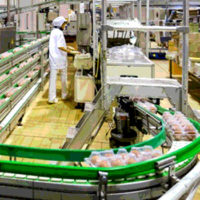To comply with provisions of the Food Safety Modernization Act (FSMA), many food processors are making upgrades to—or even overhauling—their manufacturing supply chains to meet new standards for anticipating and preventing contamination and recall issues. The final rules also call for rigorous demands in food transportation. Manufacturers, those transporting food and receiving it, must execute best practices in sanitation, temperature control, cleanliness and record keeping. Negligence in any of these steps can result in serious threats to food safety.
For small and medium-sized processors (companies with 500 employees or less), the transformation presents more obstacles due to limited resources and in-house expertise. Although there are many challenges that come along with FSMA compliance, food processing professionals should keep in mind that a safe supply chain minimizes risks to their brands. The more thorough their plans to anticipate, prevent and, if necessary, execute a recall, the less likely it is that a food safety issue will erode their short- and long-term profitability. Implementing the right solutions is the first step to success.[1]
Getting Caught Off-Guard comes at Great Cost
In the event of a product contamination issue, the average cost of a recall is a whopping $10 million. It includes costs associated with communication across the supply chain to all stakeholders about the issue, the retrieval and likely destruction of the recalled product, investigation of why it occurred and implementation of corrections to prevent reoccurrence. It does not include litigation expenses should any tragic events occur—such as injuries and even death. Additional costs include loss of sales, brand equity and brand crisis management.[2] FSMA compliance reinforces food processors’ efforts to avoid such scenarios.
Moreover, as the globalization of food production has made the supply chain increasingly more complex, processors are required to know their suppliers and understand the origin of the ingredients used for their products. The U.S. Food and Drug Administration is fully committed to enforcing a proactive approach envisioned by FSMA which companies are expected to take appropriate steps to deter, detect and prevent any hazards that could make food unsafe. That is why provisions of FSMA place strong emphasis on planning, prevention and communication to minimize the potential impact of food safety hazards.
Jeffrey Barach, Ph.D., is FSMA consultant to PMMI, The Association of Packaging and Processing Technologies.
This spring, food professionals will have an opportunity to discover new solutions and insights at the inaugural ProFood Tech (Chicago; April 4–6). For more information or to register for ProFood Tech, visit profoodtech.com.
References
1. www.pmmi.org/Research/ResearchTrends.cfm?ItemNumber=32275.
2. www.tycois.com/wps/wcm/connect/ab4fd1f4-4aa2-45a3-a4f1-b91b36539e0f/LT1000-02FoodDefenseWP_Part2_hireresDigital.pdf?MOD=AJPERES.
Finding Solutions for Regulatory Compliance and Cost-Efficiency




